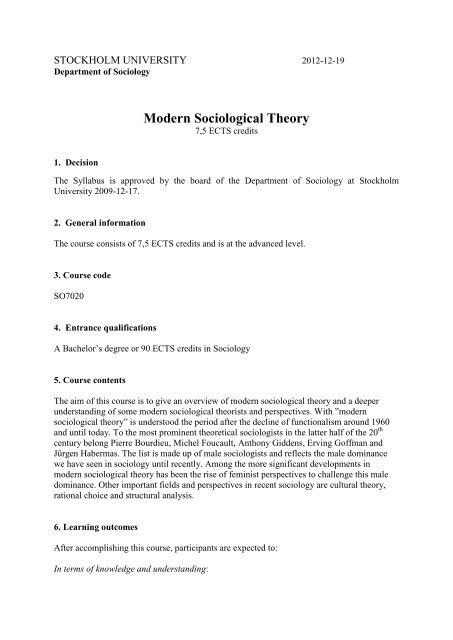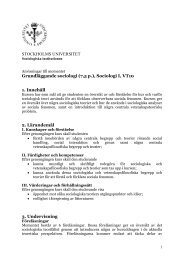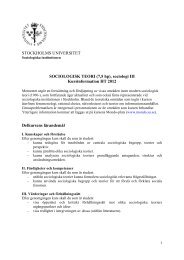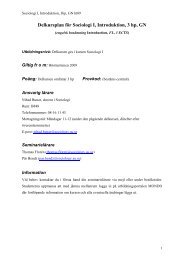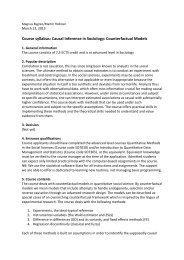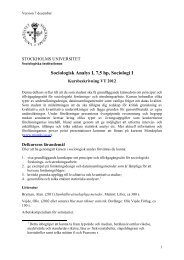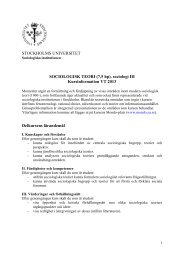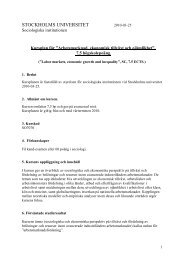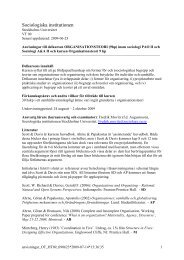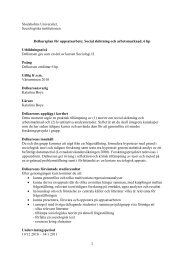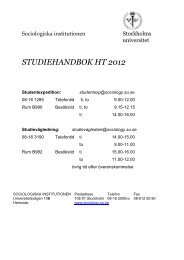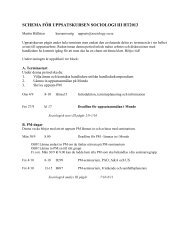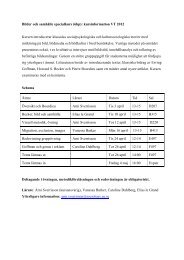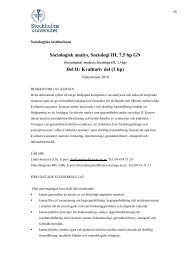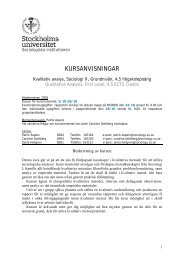Modern Sociological Theory
Modern Sociological Theory
Modern Sociological Theory
Create successful ePaper yourself
Turn your PDF publications into a flip-book with our unique Google optimized e-Paper software.
STOCKHOLM UNIVERSITY 2012-12-19<br />
Department of Sociology<br />
<strong>Modern</strong> <strong>Sociological</strong> <strong>Theory</strong><br />
7,5 ECTS credits<br />
1. Decision<br />
The Syllabus is approved by the board of the Department of Sociology at Stockholm<br />
University 2009-12-17.<br />
2. General information<br />
The course consists of 7,5 ECTS credits and is at the advanced level.<br />
3. Course code<br />
SO7020<br />
4. Entrance qualifications<br />
A Bachelor’s degree or 90 ECTS credits in Sociology<br />
5. Course contents<br />
The aim of this course is to give an overview of modern sociological theory and a deeper<br />
understanding of some modern sociological theorists and perspectives. With ”modern<br />
sociological theory” is understood the period after the decline of functionalism around 1960<br />
and until today. To the most prominent theoretical sociologists in the latter half of the 20 th<br />
century belong Pierre Bourdieu, Michel Foucault, Anthony Giddens, Erving Goffman and<br />
Jürgen Habermas. The list is made up of male sociologists and reflects the male dominance<br />
we have seen in sociology until recently. Among the more significant developments in<br />
modern sociological theory has been the rise of feminist perspectives to challenge this male<br />
dominance. Other important fields and perspectives in recent sociology are cultural theory,<br />
rational choice and structural analysis.<br />
6. Learning outcomes<br />
After accomplishing this course, participants are expected to:<br />
In terms of knowledge and understanding:
• Have knowledge about the principal lines in the development of modern sociological<br />
theory.<br />
• Understand the meaning of central concepts and theories in modern sociological<br />
theory.<br />
• Be able to identify important similarities and differences between modern sociological<br />
theories.<br />
• Know how modern sociology has been shaped by classical sociology.<br />
In terms of accomplishment and competence:<br />
• Be able to account for, and to analyse, the content of central texts by modern<br />
sociologists in a clear, well put and well argued manner.<br />
• Be able to use relevant parts of modern sociological theory to analyse social<br />
phenomena.<br />
In terms of values and evaluation:<br />
• To be able to critically assess modern sociological theories in terms of their merits and<br />
limitations.<br />
7. Instruction<br />
The course is provided at half-time basis over 10 weeks, from January 17 to March 18, 2011.<br />
Teaching takes the form of 9 lectures that present the theories and perspectives treated in<br />
course and 8 seminars on the texts in the course literature. Participants meet once a week<br />
during 9 weeks. The last week of the course is devoted to the take-home examination paper.<br />
8. Examination<br />
Examination is in the form of two assignments. Course members are expected to write (1)<br />
abstracts of all articles and book chapters that do not already have an abstract and short<br />
summaries of the remaining articles and book chapters, and (2) reviews of the books by<br />
Pierre Bourdieu and Peter Hedström. The abstracts should be about 250 words per article and<br />
the summaries a little bit longer. The reviews should be 6-8 pages long and contain references<br />
to the texts. To pass, students are required to attend lectures and to participate actively in the<br />
seminars. The abstracts and summaries should be delivered successively each week and the<br />
paper should be handed in at the end of the course on March 22.
The course work and examination is evaluated according to the following degrees:<br />
A = Excellent. To achieve this grade the student must be able to account for the<br />
content of the course literature clearly and precisely, critically analyse and compare<br />
concepts and theories, argue convincingly for the interpretations and conclusions, and<br />
use relevant parts of modern sociological theory in independent analyses of social<br />
phenomena.<br />
B = Very good. To achieve this grade the student must be able to account for the<br />
content of the course literature clearly and precisely, critically analyse and compare<br />
concepts and theories, argue convincingly for interpretations and conclusions, and use<br />
relevant parts of modern sociological theory in relatively independent analyses of<br />
social phenomena.<br />
C = Good. To achieve this grade the student must be able to account for the content of<br />
the course literature fairly clearly and precisely, critically analyse concepts and<br />
theories, provide arguments for interpretations and conclusions, and use relevant parts<br />
of modern sociological theory in relatively independent analyses of social phenomena.<br />
D = Satisfactory. To achieve this grade the student must be able to give a fairly<br />
accurate account of the content of the course literature, analyse concepts and theories,<br />
provide arguments for interpretations and conclusions, and use relevant parts of<br />
modern sociological theory in analyses of social phenomena.<br />
E =Sufficient. To achieve this grade the student must be able to give a fairly accurate<br />
account of the content of the course literature.<br />
Fx = Insufficient. To achieve this grade the student must be able to account for the<br />
course literature to some extent.<br />
F= Fail. The student cannot account for the content of the course literature in a way<br />
that is at all satisfactory.<br />
E is needed to pass the course. Students with grade Fx or F at an exam are entitled to take<br />
another exam as long as the course is provided in order to achieve grade E at least. A student<br />
with E is not entitled to another examination to raise his/her degree. Students can request to<br />
have examination according to this syllabus up to three semesters after it has stopped to be<br />
valid. Students who received grade Fx or F on exams twice from the same examiner can<br />
request to be evaluated by another examiner. Such request should be sent to the Director of<br />
Studies.
9. Schedule<br />
Monday 21.1<br />
Introduction and Lecture on Structural-Functionalism<br />
13-16, F487 Talcott Parsons och Robert Merton (18, 21, 22).<br />
Jens Rydgren, Lars Udehn<br />
Thursday 24.1<br />
Micro-sociology: Alfred Schutz, Herbert Blumer<br />
13-16, FB610 and Erving Goffman (2, 15, 23).<br />
Lars Udehn<br />
Tuesday 29.1 Michel Foucault and Jürgen Habermas (11, 12, 13, 16).<br />
13-16, FB610 Lars Udehn<br />
Tuesday 5.2 Anthony Giddens and Pierre Bourdieu (5, 7, 14).<br />
13-16, FB620 Lars Udehn<br />
Tuesday 12.2 The Cultural Turn (3, 6, 20, 24).<br />
13-16,FB610<br />
Jens Rydgren<br />
Tuesday 19.2 Structural Analysis (1, 10, 19)<br />
13-16, FB610 Jens Rydgren<br />
Tuesday 26.2 Rational Choice/Analytical Sociology (4, 8, 9, 17)<br />
12-15, E487 Jens Rydgren<br />
Monday 5.3<br />
Feminism (to be added later)<br />
13-16, FB610 Barbara Hobson<br />
Tuesday 12.3<br />
Micro-Macro<br />
13-16, FB610 Jens Rydgren, Lars Udehn<br />
10. Literature<br />
Obs! There can be minor changes of articles, but not of books, in the list below.<br />
1. Blau, Peter (1977) A Macrosociological <strong>Theory</strong> of Social Structure. American Journal of<br />
Sociology, 83, 26-54.<br />
2. Blumer, Herbert (1966) <strong>Sociological</strong> Implications of the Thought of George Herbert Mead.<br />
The American Journal of Sociology. 71, 535-544.<br />
3. Blumer, Herbert (1969) “Fashion: From Class Differentiation to Collective Selection”.<br />
<strong>Sociological</strong> Quarterly, 10, 275-291. We have failed to create a link for this text, but
you can find it in the university library (electronic Journal) and if you seek it in Google<br />
Scholars.<br />
4. Boudon, R. (2003) Beyond Rational Choice <strong>Theory</strong>. “Beyond Rational Choice <strong>Theory</strong>”.<br />
Annual Review of Sociology, 29, 1-21.<br />
5. Bourdieu, Pierre ([1980] 1990) The Logic of Practice. Stanford: Stanford University Press.<br />
Book I, 142 pages.<br />
6. Bourdieu, Pierre (1983) “The Field of Cultural Production, or: The Economic World<br />
Reversed”, Poetics, 12, 311-56.<br />
http://www.sciencedirect.com/science?_ob=MImg&_imagekey=B6VC3-466GRYH-8-<br />
1&_cdi=5943&_user=2195977&_orig=search&_coverDate=11%2F30%2F1983&_sk=<br />
999879995&view=c&wchp=dGLbVlzzSkWA&md5=8f1c19e800b6ea8b98ebffdee10a20c9&ie=/sdarticle.pdf<br />
7. Bourdieu, Pierre ([1986] 2002) “Forms of Capital”. In Nicole Woolsey Biggart (red.)<br />
Readings in Economic Sociology. London: Blackwell, 280-291.<br />
8. Coleman, James S. (1986) Social <strong>Theory</strong>, Social Research, and a <strong>Theory</strong> of Action. The<br />
American Journal of Sociology, 91, 1309-35.<br />
9. Elster, Jon (1982) The Case for Methodological Individualism. <strong>Theory</strong> and Society, 11, 453-<br />
482.<br />
10. Feld, Scott (1981) The Focused Organization of Social Ties. American Journal of<br />
Sociology, 86, 1015-1035.<br />
11. Foucault, Michel ([1976] 1980) “Lecture Two: 14 Jabuary 1976” in Power/Knowledge.<br />
Brigton: Harvester Press, 93-108.<br />
12. Foucault, Michel (1982) The Subject and Power. Critical Inquiry, 8, 777-795.<br />
13. Fraser, Nancy (1985) What's Critical about Critical <strong>Theory</strong>? The Case of Habermas and<br />
Gender. New German Critique. Nr. 35, 97-131.<br />
14. Giddens, Anthony (1984) “Elements of a <strong>Theory</strong> of Structuration”. In The Constitution of<br />
Society. Cambridge: Polity Press, 1-40.<br />
15. Goffman, Erwing (1961) “Role Distance”. I Encounters. Indianapolis: Bobbs-Merill, 82-<br />
152.<br />
16. Habermas, Jürgen (1975) Towards a Reconstruction of Historical Materialism. <strong>Theory</strong> and<br />
Society, 2, 287-300.<br />
17. Hedström, Peter (2005) Dissecting the Social. Cambridge: Cambridge University Press.<br />
170 pages.
18. Merton, Robert K. The Unanticipated Consequences of Purposive Social Action. American<br />
<strong>Sociological</strong> Review, 1, 894-904.<br />
19. Merton, Robert (1976) “Structural Analysis in Sociology”. In Peter M. Blau (ed.)<br />
Approaches to the Study of Social Structure. New York: The Free Press. Excerpt pp. 31-<br />
37.<br />
20. Meyer, John W. & Rowan, Brian (1977) Institutionalized Organizations: Formal Structure<br />
as Myth and Ceremony. American Journal of Sociology, 83, 340-363.<br />
21. Parsons, Talcott and Merton Robert K. (1948) The Position of <strong>Sociological</strong> <strong>Theory</strong>.<br />
American <strong>Sociological</strong> Review, 13, 156-168 (don’t read Newcomb, pp. 168-71).<br />
22. Parsons, Talcott (1968) “Social Systems”. International Encyclopedia of the Social<br />
Sciences, New York: Macmillan, 458-473.<br />
23. Schutz, Alfred, [1940] “The Social World and the <strong>Theory</strong> of Social Action”. Social<br />
Research, 27, 1960: 203-221. (available in the university library)<br />
24. Swidler, Ann (1986) Culture in Action: Symbols and Strategies. American <strong>Sociological</strong><br />
Review, 51, 273-286.<br />
25. Zerubavel, Eviatar (1996) Lumping and Splitting: Notes on Social Classification.<br />
<strong>Sociological</strong> Forum, 11, 421-433.<br />
In addition to the above literature, there will be some texts added on feminism and<br />
the relation between micro and macro.<br />
The books by Bourdieu and Hedström are avaliable at Akademibokhandeln, Frescati.<br />
Texts 7, 11, 14, 15, 19 and 22 will be for sale at the introduction. The remaining texts<br />
can be downloaded from the internet.<br />
Teachers: Jens Rydgren, e-mail: jens.rydgren@sociology.su,se, tel. 08-163176<br />
Lars Udehn, e-mail: lars.udehn@sociology.su.se, tel. 08-163917.


